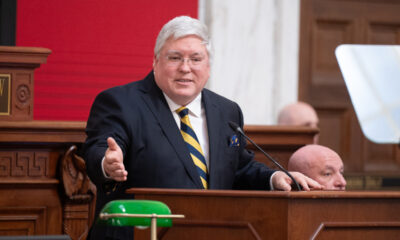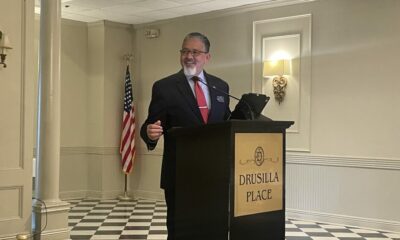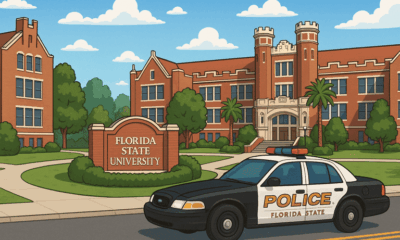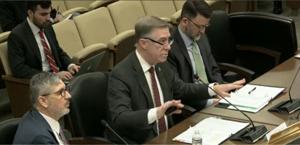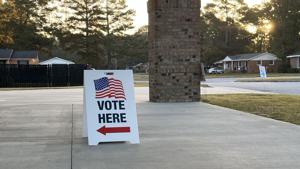virginiamercury.com – Markus Schmidt – 2025-04-17 12:14:00
by Markus Schmidt, Virginia Mercury
April 17, 2025
The Virginia Department of Health (VDH) on Wednesday issued a blistering final report on the January water crisis that left Richmond residents and businesses without clean drinking water for days — and delivered a second formal notice of violation against the city, demanding a full corrective action plan.
The 314-page VDH report, based on a 60-day independent investigation by the engineering firm Short Elliott Hendrickson (SEH), found a long chain of preventable failures at the city’s 100-year-old Water Treatment Plant.
These included neglected maintenance, faulty backup systems, poor emergency planning, and risky decisions that left the plant vulnerable during a winter storm. A single power outage on the morning of Jan. 6 led to catastrophic flooding of underground equipment rooms, halting water production and triggering a system-wide drop in pressure that forced boil water advisories across the city and surrounding counties for nearly a week.
“This crisis could have been prevented with better operational decisions,” said State Health Commissioner Dr. Karen Shelton, who described the findings in stark terms. “Our goal now is to ensure corrective actions are taken swiftly and effectively, so Richmond-area families can trust their water supply.”
The report revealed that city officials were operating the plant in “winter mode,” relying solely on overhead power lines despite known flood risks and vulnerabilities. When those lines failed, the backup systems didn’t work — largely because of neglected maintenance. Critical batteries weren’t tested. Key valves didn’t shut, and manual procedures meant to kick in during emergencies proved ineffective.
In her letter to Gov. Glenn Youngkin and Richmond Mayor Danny Avula, Shelton didn’t mince words. As reported by The Richmonder this week, she contrasted VDH’s investigation with the city’s own internal review, asserting that “the water crisis was completely avoidable and should not have happened.”
Youngkin echoed that sentiment in a statement Wednesday, calling the disruption of a safe and reliable water supply “unacceptable.” He said, “It should never happen again, and I’ve directed the Department of Health to ensure Richmond takes all corrective actions necessary to achieve that objective.”
The governor praised Richmond-area residents for their resilience, saying they “persevered through this preventable crisis,” and now city leaders must “step up for their citizens.”
The report outlines a cascade of failures triggered by a relatively minor snow and ice event.
Around 5:45 a.m. on Jan. 6, the Water Treatment Plant lost power. A bus tie switch designed to transfer power from a backup source failed, and for over an hour, the facility operated in the dark. Water continued to flow through the plant by gravity — into a subsurface clearwell — but without power, key valves stayed open.
Water inundated the underground equipment rooms, flooding critical pumps and electrical systems. Backup batteries, which were supposed to shut valves and prevent flooding, had not been maintained and failed.
By the time the city issued a Boil Water Advisory that afternoon, it was already too late. Pressure had dropped below safe levels, and the city struggled for days to restore full water service. Water production was partially restored on Jan. 8, and fully restored the next day. The boil order wasn’t lifted until Jan. 11.
The VDH and SEH review paints a broader picture of systemic dysfunction at the Department of Public Utilities (DPU). Investigators described a “culture of complacency,” where staff had normalized working around broken or substandard systems instead of fixing them. Manual operation was routine. Training was limited. And serious risks — like flooding from the clearwell — were well known but never resolved.
Despite this, officials say there are signs of progress.
Mayor Danny Avula said he was “incredibly proud” of the work DPU Director Scott Morris and his team have done since the crisis, noting that much of the VDH’s report aligns with an independent investigation the city commissioned from the firm HNTB.
“We’ll of course review it and think through the best ways to integrate its recommendations into our work moving forward,” Avula said in a statement.
The city has already spent $5 million on emergency repairs and is proposing more than $60 million in upgrades as part of its five-year capital improvement plan. The plan includes electrical upgrades, automation improvements, and a redesigned overflow system for the clearwell to prevent future flooding.
Still, the city will now be required to implement a formal Corrective Action Plan under the second notice of violation issued by VDH this week.
Janet Kelly, Virginia’s Secretary of Health and Human Resources, said the water crisis exposed both long-standing infrastructure problems and serious day-of operational failures.
“An entire region including businesses, restaurants, schools, and the most vulnerable citizens in Richmond lost a basic human need,” she said. “We hope that the city of Richmond continues to address both the long-term and immediate components of this crisis.”
The SEH report also includes a sweeping “needs assessment” of Richmond’s water infrastructure, identifying over $63 million in additional improvements needed across the treatment plant and distribution system. These include relocating vulnerable electrical equipment, installing automated transfer switches, and updating decades-old design elements that are still allowed under legacy exemptions to state water regulations.
In all, the SEH team spent nearly 1,500 hours combing through records, touring facilities, interviewing staff, and analyzing system data. They concluded that while DPU staff showed commitment and technical know-how, the broader system failed to prioritize its most important goal: delivering safe, reliable water to the people of Richmond.
To help local businesses and nonprofits recover from the storm’s economic toll, Youngkin also announced Wednesday that the U.S. Small Business Administration has made Economic Injury Disaster Loans available. These loans aim to help organizations hurt by January’s power and water outages to cover ongoing operational costs.
Looking ahead, the state says it will work closely with city officials to ensure every recommendation is taken seriously.
“We can’t afford another crisis like this,” said Shelton. “And we won’t accept another excuse.”
YOU MAKE OUR WORK POSSIBLE.
SUPPORT
Virginia Mercury is part of States Newsroom, a nonprofit news network supported by grants and a coalition of donors as a 501c(3) public charity. Virginia Mercury maintains editorial independence. Contact Editor Samantha Willis for questions: info@virginiamercury.com.
The post State faults Richmond for water failures and demands corrective action appeared first on virginiamercury.com






